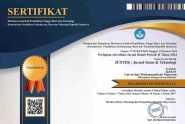Financial Management of the Muhammadiyah Mosque of Bantaeng City, Indonesia as an Improvement Effort Mosque Welfare
Abstract
Keywords
Full Text:
PDFReferences
Ahyani, H., & Nurhasanah, E. (2020). Peran Strategi Politik Islam Terhadap Perekonomian Di Indonesia. Mutawasith: Jurnal Hukum Islam. https://doi.org/10.47971/mjhi.v3i1.185
Apriyanti, H. W. (2017). Islamic Social Finance Accountability Practice. IJIBE: International Jurnal of Islamic Business Ethics.
Batubara, M., & Sibral Malasyi. (2024). The Management of Zakat and Waqf in the Economic Development Efforts of Aljazair. Economit Journal: Scientific Journal of Accountancy, Management and Finance. https://doi.org/10.33258/economit.v4i1.1056
Brekke, T., Kühle, L., Larsson, G., & Martikainen, T. (2019). Mosques, Muslims, Methods: The Role of Mosques in Research about Muslims in Europe. Journal of Muslims in Europe. https://doi.org/10.1163/22117954-12341394
Cheema, A. R., Scheyvens, R., Glavovic, B., & Imran, M. (2014). Unnoticed but important: Revealing the hidden contribution of community-based religious institution of the mosque in disasters. Natural Hazards. https://doi.org/10.1007/s11069-013-1008-0
Fitria, Y., Diyanti, F., & Bone, H. (2022). Financial Management Accountability of Mosque in Covid-19 Pandemic: The Religious and Humanist Side Exploration. Jurnal Ilmiah Akuntansi Dan Bisnis. https://doi.org/10.24843/jiab.2022.v17.i02.p04
Grassa, R., & Matoussi, H. (2014). Corporate governance of Islamic banks: A comparative study between GCC and Southeast Asia countries. International Journal of Islamic and Middle Eastern Finance and Management. https://doi.org/10.1108/IMEFM-01-2013-0001
Gunawan, N., & Faizah, S. I. (2020). Pemberdayaan Berbasis Masjid Melalui Dana Corporate Social Responsibility (Studi Kasus Program Aksi Ummad). Jurnal Ekonomi Syariah Teori Dan Terapan. https://doi.org/10.20473/vol7iss20202pp332-344
Haraty, H. J. S., Raschid, M. Y. M., & Utaberta, N. (2018). Transforming mosques into a containment space during natural disasters; Browsing through Recent Publications. International Journal of Engineering and Technology(UAE). https://doi.org/10.14419/ijet.v7i3.7.16219
Irvine, H. (2005). Balancing money and mission in a local church budget. Accounting, Auditing and Accountability Journal. https://doi.org/10.1108/09513570510588733
Karadag, H. (2015). Financial Management Challenges In Small And Medium-Sized Enterprises: A Strategic Management Approach. EMAJ: Emerging Markets Journal. https://doi.org/10.5195/emaj.2015.67
Leong, K. (2018). FinTech (Financial Technology): What is It and How to Use Technologies to Create Business Value in Fintech Way? International Journal of Innovation, Management and Technology. https://doi.org/10.18178/ijimt.2018.9.2.791
Maryati, U., Fontanella, A., Yentifa, A., & Ermataty Hatta, dan. (2018). Literasi Pelaporan Keuangan Pengurus Masjid Untuk Meningkatkan Transparansi Dan Akuntabilitas Keuangan Masjid. In Jurnal Akuntansi & Manajemen.
Mohamed, I. S., Aziz, N. H. A., Masrek, M. N., & Daud, N. M. (2014). Mosque Fund Management: Issues on Accountability and Internal Controls. Procedia - Social and Behavioral Sciences. https://doi.org/10.1016/j.sbspro.2014.06.026
Muslim, A., Karsidi, R., Wijaya, M., & Joebagio, H. (2014). A Mosque-Based Economic Empowerment Model for Urban Poor Community. International Journal of Social Science Research. https://doi.org/10.5296/ijssr.v2i2.5472
Nining Islamiyah, N. (2019). The Financial Management Practice Of Mosque: Study Case In Malaysia. Jurnal Akuntansi Dan Keuangan Indonesia. https://doi.org/10.21002/jaki.2019.06
Purnasari, M., Hartiwi, Y., & Nurhayati, N. (2022). Perancangan Sistem Informasi Pengelolaan Dana Masjid Berbasis Web Menggunakan Unified Modeling Language (UML). Resolusi : Rekayasa Teknik Informatika Dan Informasi. https://doi.org/10.30865/resolusi.v2i6.416
Rahman, M. F. B. A., Mastuki, N., & Yusof, S. N. S. (2015). Performance Measurement Model of Mosques. Procedia Economics and Finance. https://doi.org/10.1016/s2212-5671(15)01128-4
Robani, A., Ahamat, A., Hassan, S. N. S., Latief, H., & Pratiwi, A. (2022). Islamic solidarity economy: the case study of social entrepreneurship in Pesantren, Indonesia. Middle East J. of Management. https://doi.org/10.1504/mejm.2022.126316
Saad, R. A. J., Aziz, N. M. A., & Sawandi, N. (2014). Islamic Accountability Framework in the Zakat Funds Management. Procedia - Social and Behavioral Sciences. https://doi.org/10.1016/j.sbspro.2014.11.139
Sanusi, Z. M., Johari, R. J., Said, J., & Iskandar, T. (2015). The Effects of Internal Control System, Financial Management and Accountability of NPOs: The Perspective of Mosques in Malaysia. Procedia Economics and Finance. https://doi.org/10.1016/s2212-5671(15)01095-3
Triayudha, A., Pramitasary, R. N., Anas, H. A., & Mahfud, C. (2019). Relations Between Mosque And Social History Of Islamic Education. HUNAFA: Jurnal Studia Islamika. https://doi.org/10.24239/jsi.v16i1.531.142-153
DOI: https://doi.org/10.31764/justek.v7i4.29408
Refbacks
- There are currently no refbacks.
JUSTEK : Jurnal Sains dan Teknologi sudah terindeks
EDITORIAL OFFICE:












.JPG)

